外研版小学英语四年级上册英语复习资料
外研版(三起)小学英语四年级上册Module 10重要知识点汇总
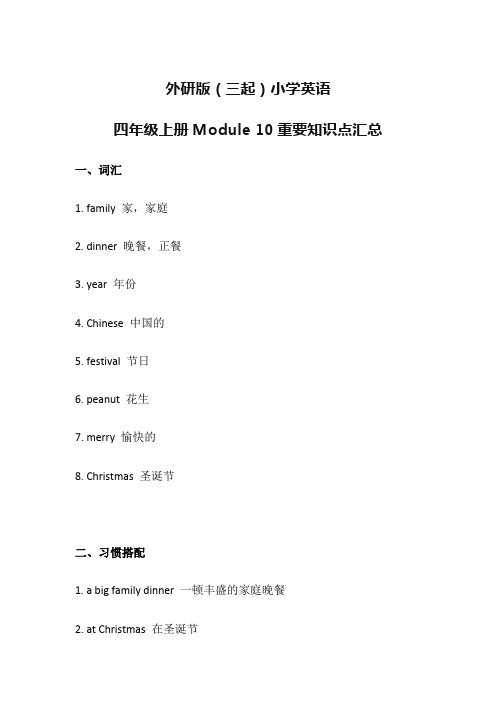
外研版(三起)小学英语四年级上册Module 10重要知识点汇总一、词汇1. family 家,家庭2. dinner 晚餐,正餐3. year 年份4. Chinese 中国的5. festival 节日6. peanut 花生7. merry 愉快的8. Christmas 圣诞节二、习惯搭配1. a big family dinner 一顿丰盛的家庭晚餐2. at Christmas 在圣诞节3. the Spring Festival 春节4. New Year 新年三、惯用表达1. I see. 我明白了。
2. Happy New Year! 新年快乐!3. Merry Christmas! 圣诞快乐!四、重点句型1. At / On + 节日名称, We + 动词(短语)原形(+ 其他).举例:At the Spring Festival, we have a big family dinner.在春节,我们吃一顿丰盛的家庭晚餐。
举例:At the Dragon Boat Festival, we eat zongzi and have dragon boat races. 在端午节,我们吃粽子,举行龙舟比赛。
2. –What do you do at / on + 节日?–I / We + 动词(短语)原形(+ 其他).问:What do you do at Christmas? 在圣诞节你们做什么?答:We sing songs. 我们唱歌。
问:What do you do at the Spring Festival? 在春节你做什么?答:I eat dumplings with my family. 我和我的家人一起吃饺子。
外研版小学英语一起四年级上册知识点汇总

外研版小学英语一起四年级上册知识点汇总外研(一起)四年级Module 1 知识汇总四、重点句型1.表达“我有......”的句型:I’ve got + 其他.eg: I’ve got a new book.2.描述过去某天是我的生日的句型:It was my birthday >具体某一天.eg: It was my birthday on Friday.外研(一起)四年级Module 2 知识汇总一、词汇三、重点句型表达“过去某人做某事”:主语 + 动词过去式 + 其他. eg: I cleaned my room.Jenny washed her skirt.We went to the park.外研(一起)四年级Module 3 知识汇总四、重点句型1.描述“某人过去没有做某事”的句型:主语+ didn’t + 事情+ 时间.eg: 1.She didn’t play football yesterday.2.They didn't watch TV last week.外研(一起)四年级Module 4 知识汇总一、词汇1. invent 发明,创造2. paper 纸3. important 重要的4. printing 印刷术5. print 印刷6. right 正确的,对的7. between 在……之间8. bicycle 自行车9. mouse 老鼠10. man 男人二、习惯搭配1. Chinese people 中国人2. this week 这个星期3. invent paper 发明纸4. invent printing 发明印刷术5. look at 看6. print books and newspapers 印刷书和报纸7. in front of 在……前面8. Last Monday 上星期一9. invent many important things 发明很多重要的东西三、惯用表达1. That’s right. 没错。
外研版小学四年级英语上册m1-5知识点(期中复习)

外研版小学四年级英语上册m1-5知识点(期中复习)外研版小学四年级英语上册M1-5知识点(期中复)Unit M1- 单词:- 姓氏:姓、名字、姓氏、第一个名字、最后一个名字、也姓- 问好:你好、早上好、下午好、晚上好、再见- 国籍:中国、英国、美国、澳大利亚- 句型:- What's your name?(你叫什么名字?)- My name is [name].(我的名字是[name]。
)- Nice to meet you.(很高兴见到你。
)Unit M2- 单词:- 数字:一、二、三、四、五、六、七、八、九、十- 颜色:红色、蓝色、黄色、绿色、橙色、紫色、粉红色- 课程:数学、英语、音乐、体育、科学、美术- 句型:- What's your favorite color?(你最喜欢的颜色是什么?)- My favorite color is [color].(我最喜欢的颜色是[color]。
)- What subject do you like?(你喜欢什么科目?)- I like [subject].(我喜欢[subject]。
)Unit M3- 单词:- 时钟数字:一点、两点、三点、四点、五点、六点、七点、八点、九点、十点、十一点、十二点- 时间表达:早上、上午、中午、下午、晚上- 句型:- What time is it?(现在几点了?)- It's [time].(现在是[time]。
)- What time do you get up?(你几点起床?)- I get up at [time].(我[time]起床。
)Unit M4- 单词:- 家庭成员:爸爸、妈妈、哥哥、姐姐、弟弟、妹妹、爷爷、奶奶- 姐妹关系:亲姐姐、亲妹妹、亲兄弟、亲弟弟- 长幼关系:大哥、二哥、大姐、二姐、大妹、二妹- 句型:- Who's this?(这是谁?)- This is my [family member].(这是我的[family member]。
外研版一年级起点小学英语四年级上册四会单词及句子学习资料

1.I cleaned my room.昨天我打扫了我的间。
2.I washed my trousers.我洗了我的裤子。
3.I finished my homework.我完成了我的作业。
4.I helped my mum.我帮助了我的妈妈。
5. Amy painted a picture. Amy画了一幅画。
2.And she didn’t walk to school.并且她没有走着去学校。
3. She didn’t haveEnglishat school.她在学校没有上英语课。
4.I didn’t play football.我没有踢足球。
Module 4
Chinese中国人
invent发明,创invented(invent过去式)
四年级上册四会单词及句子
模块
单词
句子
Module 1
dear亲爱的
well健康的
of……的
tell告诉,讲述
love爱你的
cold寒冷的
letter信
live居住
soon不久,很快
Buckingham Palace白金汉宫
1. It was my birthday on Saturday.星期六是我的生日。
Module 6
woman妇女,女性
bad坏的,不好的
take拿走took(take过去式)
say说said(say过去式)
angry生气的,愤怒的
become变成became(become过去式)
gold金子
only只,仅仅
ago以前,以往
long ago很久以前
away离开,离去
全]外研版(三起)小学英语四年级上册知识点归纳总结
![全]外研版(三起)小学英语四年级上册知识点归纳总结](https://img.taocdn.com/s3/m/425c03e86e1aff00bed5b9f3f90f76c661374cd0.png)
全]外研版(三起)小学英语四年级上册知识点归纳总结Module 1:In Module 1.we learn about words that express n and n。
such as "left," "right," "next to," "beside," and "near." We also learn some common places。
like "street," "supermarket," "n," "cinema," and "house." nally。
we learn about the phrase "live at," the use of "turn left/right," and the n "thank you so much." The key sentence structure we learn is "Where is。
" followed by "It's + n."Module 2:In Module 2.we learn about verbs like "read," "take," "listen," and "talk," as well as the noun "picture" and the plural form of "child." We also learn about the phrase "take pictures," and common activities like "play with," "listen to," "look at," "talk to," "read a book," "play football," and "watch TV." There are no new XXX.XXX's Day OutMary is a young girl who is having a fun day out with her family。
外研版英语小学四年级上学期复习试题与参考答案
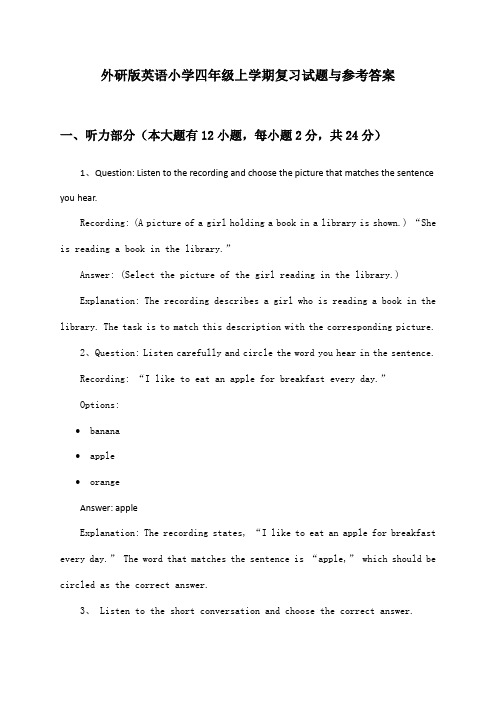
外研版英语小学四年级上学期复习试题与参考答案一、听力部分(本大题有12小题,每小题2分,共24分)1、Question: Listen to the recording and choose the picture that matches the sentence you hear.Recording: (A picture of a girl holding a book in a library is shown.) “She is reading a book in the library.”Answer: (Select the picture of the girl reading in the library.)Explanation: The recording describes a girl who is reading a book in the library. The task is to match this description with the corresponding picture.2、Question: Listen carefully and circle the word you hear in the sentence.Recording: “I like to eat an apple for breakfast every day.”Options:•banana•apple•orangeAnswer: appleExplanation: The recording states, “I like to eat an apple for breakfast eve ry day.” The word that matches the sentence is “apple,” which should be circled as the correct answer.3、 Listen to the short conversation and choose the correct answer.A)The book is on the desk.B)The book is in the bag.C)The book is under the chair.Answer: A) The book is on the desk.Explanation: In the listening material, the speaker clearly states that the book is placed on the desk. The answer options refer to different locations of the book, and A is the only one that matches the description given in the audio.4、 Listen to the instructions and answer the question.Question: What is the second task in the list?A)Clean the room.B)Do your homework.C)Set the table for dinner.Answer: B) Do your homework.Explanation: In the listening section, a series of tasks are mentioned, and the speaker asks specifically about the second task. After listing the tasks, if the second task mentioned is “Do your homework,” then B is the correct answer. This question requires attention to detail and memory recall of the sequence of tasks provided in the audio.5、Listen to the dialogue and choose the correct answer.(听对话,选择正确答案)Question: What is the boy going to do tomorrow?A. He’s going to play football.B. He’s going to visit his grandparents.C. He’s going to have a picnic.Answer: BExplanation: The dialogue mentions that the boy tells his mother he is not going to play football tomorrow because he is going to visit his grandparents. This directly corresponds to option B, “He’s going to visit his grandparents.”6、Listen to the passage and answer the question.(听短文,回答问题)Question: How many days are there in a week?A. Five days.B. Six days.C. Seven days.Answer: CExplanation: The passage should mention that there are seven days in a week, which includes Monday, Tuesday, Wednesday, Thursday, Friday, Saturday, and Sunday. This corresponds to option C, “Seven days.”7、Listen to the dialogue and choose the correct answer.Question: What does the boy want to be when he grows up?A. A teacher.B. A doctor.C. A scientist.Answer: BExplanation: The dialogue may contain a sentence like, “I want to help people when they are sick. So, I want to be a doctor when I grow up.” Thisresponse indicates that the boy wants to be a doctor, hence the answer is B.8、Listen to the passage and answer the question.Question: How many books does the library have in total?A. 2,000 books.B. 3,500 books.C. 5,000 books.Passage Preview: (Note: This is a preview to help construct the answer and explanation, as the actual passage will be spoken.) “Our s chool library is a treasure trove of knowledge. It houses over 3,000 books on various subjects, ranging from fiction to science. Last year, we added another 500 books to our collection, bringing the total number of books to…”Answer: BExplanation: Based on the passage preview, it mentions that the library originally had over 3,000 books and last year added another 500 books. Adding these two numbers together (3,000 + 500 = 3,500), we can determine that the library now has 3,500 books in total, hence the answer is B.9、Listen to the passage and choose the correct answer to the question. Question: What’s the boy’s favorite sport?A. Football.B. Basketball.C. Swimming.Answer: A. Football.Explanation: The passage mentions that the boy likes playing football very much, so his favorite sport is football.10、Listen to the dialogue and fill in the blank with the missing word. Dialogue:Girl: Hi, Tom! What are you doing?Boy: Hi, Lily! I’m_______my model plane.Girl: It looks great! Can I have a look?Boy: Sure, here you are.Answer: makingExplanation: The dialogue suggests that the boy is in the process of creating something, and given the context of “my model plane,” the missing word is most likely “making.”11、Listen to the recording and choose the correct answer.Question: What time does the class start in the morning?A)8:00 amB)8:30 amC)9:00 amAnswer: B) 8:30 amExplanation: The recording would have stated the exact time when the class starts in the morning, and based on the common school timings, option B, “8:30 am,” is a likely answer.12、Listen to the conversation and answer the question.Question: Who is going to the library after school?A)SarahB)TomC)Both Sarah and TomRecording: “Sarah, are you going to the library after school today?” “Yes, I am. Are you coming too, Tom?” “Sure, I’ll join you.”Answer: C) Both Sarah and TomExplanation: The conversation indicates that both Sarah and Tom are planning to go to the library after school. Sarah asks Tom if he’s coming, and Tom confirms that he will join her.二、选择题(本大题有12小题,每小题2分,共24分)1.Which word does NOT belong in the group?A. CatB. DogC. TreeD. FishAnswer: CExplanation: This question tests the ability to identify the odd one out in a group of related words. Among the options, “Cat,” “Dog,” and “Fish” are all animals, while “Tree” is a plant. Therefore, “Tree” does not belong in the group of animals.2.Which sentence is grammatically correct?A. I have went to the park yesterday.B. Yesterday, I went to the park.C. I went to the park, yesterday.D. The park, I went yesterday.Answer: BExplanation: This question tests knowledge of English grammar, specifically tense usage and sentence structure. Option A is incorrect because “have” and “went” are not correctly paired; “have gone” is present perfect tense, while “went” is past simple tens e. Option C is grammatically correct but is less preferred in formal writing due to the comma placement, which slightly disrupts the flow. Option D has an incorrect sentence structure, with the subject and verb misplaced. Option B is both grammatically correct and follows a natural sentence structure.3、Which of the following is not a type of weather?A. SunnyB. RainyC. TallAnswer: CExplanation: “Sunny” and “Rainy” are both descriptions of weather conditions, while “Tall” describes a physical attribute (usually of height) and not a weather condition.4、What is the correct plural form of the word “child”?A. ChildsB. ChildrensC. ChildrenAnswer: CExplanation: The plural form of “child” is “children”. “Childs” and “Childrens” are incorrect formations. “Childrens” is particularly incorrect because it tries to make “children” possessive, but “children” itself is already the plural form and does not need a possessive ending.5、Which word can’t fit in the sentence “The sky is_______today.”?A. blueB. yellowC. clearD. sunnyAnswer: BExplanation: In the sentence “The sky is_______today,” the most appropriate adjectives would describe the color or condition of the sky. “Blue” (A) is a common color for the sky, especially on clear days. “Clear” (C) means the sky is free from clouds or obstructions. “Sunny” (D) also describes a sky that is bright and clear because of the sun shining. However, “yellow” (B) is nota typical color for the sky, and it wouldn’t fit well in this context.6、Choose the correct verb form to complete the sentence:“She usually_____her homework at 7:00 pm.”A. doB. doesC. doingD. didAnswer: BExplanation: The sentence “She usually_____her homework at 7:00 pm” requires a verb form that agrees with the subject “She” and expresses a habit ual action in the present tense. The subject “She” is singular, so we need a singular verb form. Option A, “do,” is the base form of the verb and is used for plural subjects or in the first and second person singular. Option B, “does,” is the third-person singular present tense form of “do,” which matches the subject “She” and the time expression “usually.” Option C, “doing,” is the present participle form and is not suitable for this sentence. Option D, “did,” is the past tense form and doesn’t match the present tense context of “usually.” Therefore, the correct answer is B.7、What is the main idea of the passage?A. The history of computers.B. The importance of technology.C. The advantages of online shopping.D. The development of the Internet.Answer: CExplanation: The passage discusses the convenience and advantages of onlineshopping, such as saving time, having a wider range of choices, and being able to compare prices easily. Therefore, the main idea is the advantages of online shopping, making option C the correct answer.8、Which of the following is NOT a reason why people enjoy traveling?A. To relax and unwind.B. To learn about new cultures.C. To escape from daily responsibilities.D. To increase the risk of accidents.Answer: DExplanation: Traveling is generally seen as an enjoyable and enriching activity, allowing people to relax, unwind, and learn about new cultures. While traveling does involve some risk, increasing the risk of accidents is not a reason why people enjoy traveling. Therefore, option D is not a reason and is the correct answer.9、I often play football_______my friends after school.A. withB. andC. to答案:A解析:本题考查的是介词的用法。
四年级上册英语复习资料(外研版)

四年级上册英语复习资料(外研版)四年级英语复习资料numbers数字:1 one, 2 two, 3 three, 4 four, 5 five, 6 six, 7 seven, 8 eight, 9 nine, 10 ten, 11 eleven, 12 twelve, 13thirteen 14 fourteen, 15 fifteen, 16 sixteen, 17 seventeen, 18 eighteen, 19 nineteen, 20 twenty, 21 twenty-one, 22 twenty-two, 23 twenty-three, 24 twenty- four25 twenty- five 26 twenty- six 27 twenty- seven 28 twenty- eight 29 twenty- nine 30 thirty, 40 forty, 50 fifty, 60 sixty, 70 seventy, 80 eighty, 90 ninety, 100 one hundred . colour颜色:red红色, green绿色,blue蓝色,yellow黄色,purple紫色,pink粉色,white白色,orange橙色,black黑色,directions方向:go straight on直着走 turn left 向左转 turn right 向右转up↑向上down↓向下months月份:january一月 february二月 march三月 april四月 may五月 june六月july七月 august八月september九月 october十月 november十一月 december十二月缩写与完整形式:i’m=i am, he’s=he is, she’s=she is, it’s=it isyou’re=you are, we’re=we are, they’re=they arethere’s=there is, there’re=there arehaven’t=have not, can’t=can not, don’t=do not,isn’t=is not, aren’t=are not,单复数:i→we,you→you,she/he/it→theyman→men p eople→people picture→picturespoint→points friend→frie nds house→housesvegetable→veget ables thing→things biscuit→biscuitsparty→parties现在分词:write→writing,take→taking, make→making,ride→riding, swim→swimming run→running, get→getting,play→playing listen→listening,read→reading,look→looking, row→rowing,drink→d rinking want→wanting,cook→cooki ng jump→jumping,wash→washing, draw→drawing, talk→talking,,。
最全外研版(三起)小学英语四年级上册知识点复习归纳总结

最全外研版(三起)小学英语四年级上册知识点复习归纳总结外研(三起)四年级上册Module 11.单词straight直地go straight on直着走left 左边lost迷路的live居住No.第……号street大街excuse me对不起,打扰turn left向左转turn right向右转next to... 临近的supermarket超市beside在……旁边cinema电影院so much十分,非常You're welcome!不客气!station车站train火车hill小山near接近,临近house房屋2.短语1)excuse me 打扰一下2)turn left 向左转3)turn right 向右转4)go straight on 直着走5)up the hill 上山6)down the hill 下山7)near the house 在房子附近3.句子(1)A: Excuse me. Where’s No.2 Park Street, please? 打扰了,请问第二公园大街在哪里?B: Go straight on and turn left. 直着走然后向左转。
(2)A: Thank you so much. 十分感谢你。
B: You are welcome. 不用谢。
(3)It’s near the house. 它在房屋附近。
(4)It’s on your left. 它在你的左边。
(5)It’s behind the cinema. 它在电影院后面。
外研(三起)四年级上册Module 21.单词read阅读running跑步these这些picture图画take拍摄take pictures照相children孩子们listen听listen to听talk说话,交谈talk to和……交谈China中国read—reading take—taking talk—talking play—playing look—looking run—running 2.短语1)read a book 读书2)take pictures 拍照3)watch TV 看电视4)play with a toy train 玩玩具火车5)ride a bike 骑自行车6)fly a kite 放风筝7)listen tomusic 听音乐8)talk tomy friend 和朋友交谈3.句子(1)This is my friend Maomao. 这是我的朋友毛毛。
外研版小学英语(一年级起点)四年级上册四会词及重点句型

四年级上册四会词及重点句型Module 11、重点单词:well好,live居住,tell告诉,warm温暖的,China中国, Chinese中国人2、重点短语:a photo of...的照片,in red 穿红色衣服的,a bit cold有点冷,read a letter 读信,tell me about...讲讲关于...,3、重点语法:①现在进行时,表示正在做某事What are you doing? I am…Be动词(am\is\are)+动词ing 表示在干什么②一般过去时be动词变为was\were 单数用was, 复数用were4、重点句型:It was my birthday on+具体某天(如Saturday)我的生日在...We were at+地点(如the Great Wall)我们在...I’ve(=I have) got a new friend.我有一个新朋友。
He’s(=He has) got short,yellow hair.他有短的、黄色的头发。
Write to me soon. 快给我回信吧。
Thank you for your letter. 多谢你的来信I will be eleven next year. 将来时will be表示将要怎样,Module 21、重点单词:wash-washed 洗,clean-cleaned打扫, finish-finished完成,help-helped帮助cook-cooked 煮,phone-phoned打电话,watch-watched看,paint-painted 绘画shirt衬衣,skirt裙子,trousers 裤子,dirty脏的,2、重点短语:cook noodles煮面条,watch TV看电视,paint a picture 画画,play the flute 吹笛子,listen to music听音乐3、重点语法:一般过去时,表示过去做了某事,变化方式:常规变化v+ed4、重点句型:重点句型:I/He/She +动词过去式...(如I helped my mum.)Module 31、重点单词:talk-talked交谈,homework家庭作业,National Day国庆节,toy玩具(复数+s)on Monday s每周一(每个周一复数),2、重点短语:get up起床,walk to school, play with和...玩耍, ride my bike骑自行车,have English in school 在学校上英语课,play football踢足球,in the park在公园,stay at home待在家,all the rooms全部的房间,talk on the phone 在电话里交谈,3、重点语法:①一般现在时,表示常常习惯做某事,标志词语:every day\usually\often\always\on Mondays(每一个周日),注意第三人称单数要+s\es.I usually+动词原形(如I usually get up at 7’clock.)我通常...He/She+动词s/es....(如She usually gets up at 7’clock.)他、她通常...②一般过去时,didn’t+动词原形,表示过去没有做某事I/He/She didn’t +动词原形....yesterday.(如I didn’t get up at 7’clock yesterday.)我/他/她没有....4、重点句型:I usually ride my bike to the park.But I didn’t ride my bike yesterday.It was raining.昨天下雨了,What a boring day!Module 41、重点单词:paper纸,printing印刷术,print-printed打印,between在...之间,beside在...旁边,单数man-复数men男人,单数woman-复数women 女人,right正确的,clever 聪明的,important 重要的,invent-invented发明,newspapers 报纸,chair 椅子,单数mouse-复数mice 老鼠,bicycle自行车,listen-listened 听2、重点短语:in front of(在...前面),between A and B (在A和B之间)between sth (在两个相同的东西之间)Between the two cars 两辆车之间beside sth (在XX旁边)3、重点语法:准确表示方位巩固过去时的用法4、重点句型:Chinese people invented paper/printing.中国人发明了造纸术/印刷术。
期末复习+词组(知识清单)外研版(三起)英语四年级上册
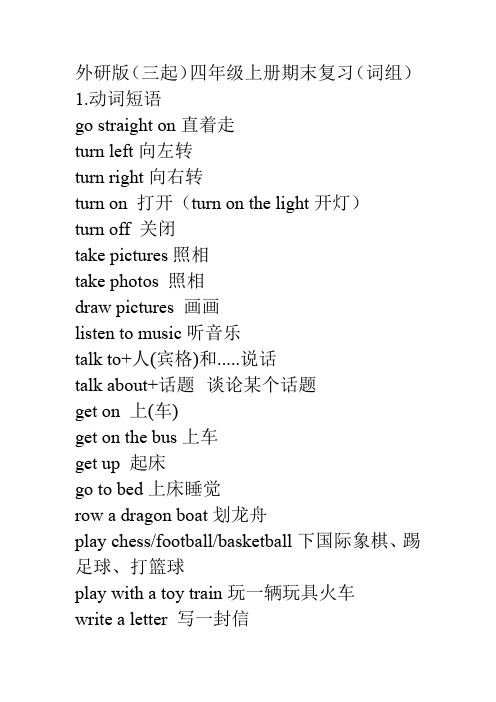
外研版(三起)四年级上册期末复习(词组)1.动词短语go straight on直着走turn left向左转turn right向右转turn on 打开(turn on the light开灯)turn off 关闭take pictures照相take photos 照相draw pictures 画画listen to music听音乐talk to+人(宾格)和.....说话talk about+话题谈论某个话题get on 上(车)get on the bus上车get up 起床go to bed上床睡觉row a dragon boat划龙舟play chess/football/basketball下国际象棋、踢足球、打篮球play with a toy train玩一辆玩具火车write a letter 写一封信watch TV看电视read a book 读书、看书(read a book about China)fly a kite放风筝drink soya milk 喝豆浆make dumplings 做饺子make noodles制作面条make a cake做一个蛋糕have a look看一看have a sports day组织一个运动日have a big family dinner吃一顿丰盛的晚餐have a Christmas tree有一棵圣诞树climb a tree爬树ride a bike/horse骑自行车、骑马do taijiquan打太极拳do the high jump 跳高do the long jump 跳远do my homework做我的家庭作业run the 100 metres 跑一百米run fast 跑得快ride fast 骑得快jump high 跳得高jump far 跳得远sing songs 唱歌(sing songs about the moon ) eat moon cakes/fruit/sweets/vegetables吃月饼、水果、糖果、蔬菜eat lots of food吃许多食物2.固定句子You're welcome.不客气。
小学四年级外研版上学期英语期末整理复习易考题
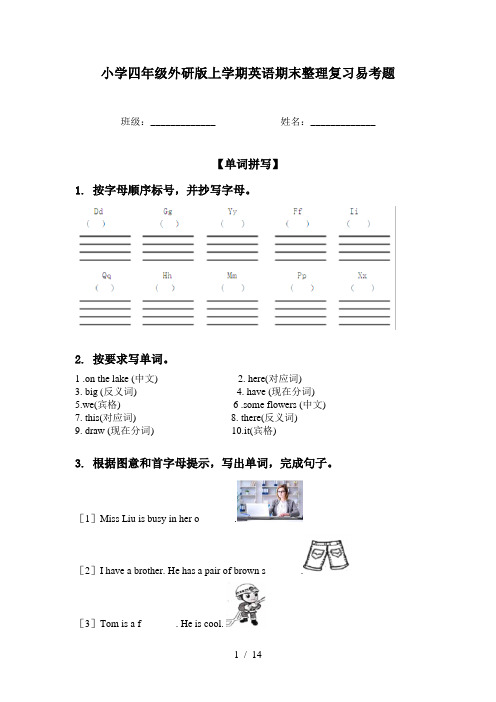
小学四年级外研版上学期英语期末整理复习易考题班级:_____________ 姓名:_____________【单词拼写】1. 按字母顺序标号,并抄写字母。
2. 按要求写单词。
1 .on the lake (中文)____________ 2. here(对应词)______________3. big (反义词)______________4. have (现在分词) ___________5.we(宾格) ______________ 6 .some flowers (中文)__________7. this(对应词)______________ 8. there(反义词)______________9. draw (现在分词) ___________ 10.it(宾格) ______________3. 根据图意和首字母提示,写出单词,完成句子。
[1]Miss Liu is busy in her o_______.[2]I have a brother. He has a pair of brown s_______.[3]Tom is a f_______. He is cool.[4]Look, the rabbit can run and j_______.[5]Mum needs three p_______ and two eggs.4. 根据所给字母拼写单词,并把图片与所对应的单词连起来。
5. 阅读短文,填入所缺单词,首字母已给出。
This is a park. It’s big and beautiful. There are many 1t_________ in it. They’re tall. There are many 2f_________ in it, too. The flowers are 3p_________, yellow an d blue. Look! There are five boys and six girls 4u_________ the tree. There is a 5t___ ______ sitting on the grass. They’re happy.【填空题】6. 读一读,根据例词的读音规则补全下列单词。
外研版小学四年级英语上六到十单元复习资料

Module 61、表示行为的短语。
turn on 打开turn off 关闭trick or treat 不请吃就捣蛋come in 进来2、表示食物的单词food 食物sweets(常复)糖果soup 汤bread 面包cake 蛋糕fruit 水果rice 米饭milk 牛奶juice 果汁noodle 面条fish 鱼meat 肉vegetable 蔬菜3、节日祝福语。
Happy Halloween! 万圣节快乐!Happy Children’s Day!六一儿童节快乐!Happy Mother’s Day! 母亲节快乐!Happy Father’s Day! 父亲节快乐!Happy birthday! 生日快乐!Happy Teachers’ Day!教师节快乐!4、句型假如你想吃某样东西,请记住这个句型吧:Can I have some…? 我能吃些……吗?回答:Yes,you can./ Sorry,you can’t.5、重点句子①Can I have some sweets? 我可以吃一些糖吗?②I’m very hungry! 我很饿了!They’re all very nice. 它们都很好吃。
③I can’t see. It’s very dark. 我看不见。
太黑了。
④Please turn on the light. 请打开灯。
⑤Can I come in? 我可以进来吗?⑥Of course. 当然。
Module 71、表示动物的单词horse 马sheep(复数也是sheep) 绵羊chicken 鸡bear 熊pig 猪panda 熊猫cat 猫parrot 鹦鹉lion 狮子tiger 老虎2、重点短语there is 有,存在(单数、不可数名词)there are 有,存在(复数名词)Look at 看ride a horse 骑马have a look 看,瞧climb a tree 爬树eat vegetables 吃蔬菜fly a kite 放风筝on the bike 在自行车上eat fruit 吃水果row a boat 划船play chess 下国际象棋under the tree 在树下3、there is 和there are的区别there is 和there are结构都表示“有,存在”,但是它们在用法上有区别。
小学英语四年级上册课本知识点(外研版三年级起点)
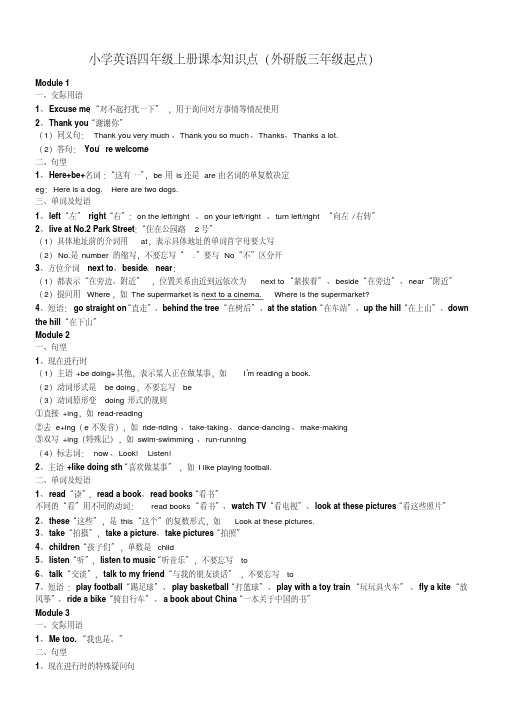
小学英语四年级上册课本知识点(外研版三年级起点)Module 1一、交际用语1、Excuse me:“对不起打扰一下”,用于询问对方事情等情况使用2、Thank you“谢谢你”(1)同义句:Thank you very much、Thank you so much、Thanks、Thanks a lot.(2)答句:You’re welcome.二、句型1、Here+be+名词:“这有…”,be用is还是are由名词的单复数决定eg:Here is a dog. Here are two dogs.三、单词及短语1、left“左”right“右”:on the left/right、on your left/right、turn left/right“向左/右转”2、live at No.2 Park Street:“住在公园路2号”(1)具体地址前的介词用at,表示具体地址的单词首字母要大写(2)No.是number的缩写,不要忘写“.”要与No“不”区分开3、方位介词next to、beside、near:(1)都表示“在旁边、附近”,位置关系由近到远依次为next to“紧挨着”、beside“在旁边”、near“附近”(2)提问用Where,如The supermarket is next to a cinema. Where is the supermarket?4、短语:go straight on“直走”、behind the tree“在树后”、at the station“在车站”、up the hill“在上山”、down the hill“在下山”Module 2一、句型1、现在进行时(1)主语+be doing+其他,表示某人正在做某事,如I’m reading a book.(2)动词形式是be doing,不要忘写be(3)动词原形变doing形式的规则①直接+ing,如read-reading②去e+ing(e不发音),如ride-riding、take-taking、dance-dancing、make-making③双写+ing(特殊记),如swim-swimming、run-running(4)标志词:now、Look! Listen!2、主语+like doing sth“喜欢做某事”,如I like playing football.二、单词及短语1、read“读”,read a book、read books“看书”不同的“看”用不同的动词:read books“看书”、watch TV“看电视”、look at these pictures“看这些照片”2、these“这些”,是this“这个”的复数形式,如Look at these pictures.3、take“拍摄”,take a picture、take pictures“拍照”4、children“孩子们”,单数是child5、listen“听”,listen to music“听音乐”,不要忘写to6、talk“交谈”,talk to my friend“与我的朋友谈话”,不要忘写to7、短语:play football“踢足球”、play basketball“打篮球”、play with a toy train“玩玩具火车”、fly a kite“放风筝”、ride a bike“骑自行车”、a book about China“一本关于中国的书”Module 3一、交际用语1、Me too.“我也是。
小学英语新外研版(一起)四年级上册M1 知识点

小学英语新外研版(一起)四年级上册Module 1知识点一、熟记短语:1. read a letter看信2. from my friend 来自我朋友3. live in London 住在伦敦4. my birthday 我的生日5. on Saturday在星期六6. a photo of me 我的一张照片7. on my birthday party在我的生日聚会上8. my new friend我的新朋友9. long, black hair又长又黑的头10. tell me about 告诉我关于---11. write to me给我写信12. at Buckingham Palace在白金汉宫13. about China关于中国14. happy birthday to you祝你生日快乐15. what about you你呢?16. Chinese friends中国朋友们17. computer games 电脑游戏18. a picture of Zara and me 我和Zara的一张照片19. a bit cold 有一点寒冷二、重点句型:1.Where does she live ? 她住在哪?She lives in London. 她住在伦敦。
2.What’s he / she doing?他/她正在做什么?He’s / She’s … .他/她正在...(现在进行时表示正在发生的事情。
)3.It was my birthday on Saturday.星期六是我的生日。
4.We were at Buckingham Palace.当时,我们在白金汉宫。
4.I’ve got a new friend. 我有一个新朋友。
She’s got a new friend. 她有一个新朋友。
补充:1.反义词:cold ---- hot warm---- cool long ---- short new ----old here---there2.缩写和完全形式:I’ve got = I have got she’s got = she has got she’s = she is3.国家China England America Russia国家人:Chinese English American Russian。
精选2019-2020年小学英语四年级上册外研版复习巩固六十四

______ you jump high?
I can jump ______.
【答案】:
【解析】:
f______s______(快)
【答案】:
【解析】:
A、fast
B、food
C、well
【答案】:
【解析】:
______(明星)
【答案】:
【解析】:
fa______(远)
【答案】:
【解析】:
你能跳得高吗?(否定回答)
Can ______ jump? No, ______ ______.
【答案】:
【解析】:
你能跑的快吗?(肯定回答)
______ you run fast? Yes, I ______.
精选2019-2020年小学英语四年级上册外研版复习巩固六十四
—Can you __________far, Amy? —Yes, I can.
A、sing
B、smile
C、listen
D、jump
【答案】:
【解析】:
I can speak__________. ?( )
A、China
B、America
【解析】:
根据短文判断正误
Hello, I"m Sam. I can jump far. I can play football. Amy is my sister. She can run fast. But she can"t jump far. Daming is my friend. He can"t jump high. But he can ride fast. Lingling is my friend too. She can"t jump far. but she plays basketball well.
外研版小学英语四年级上册重点知识完整版

外研版小学英语四年级上册重点知识HEN system office room 【HEN16H-HENS2AHENS8Q8-HENH1688】M o d u l e1一.单词(单数)—points(复数)(单数)—these(复数)二.短语1.have got 拥有三.句子1. Here’s a purple one.这儿有一个紫色的。
2. I’ve got twenty-six points.我有26分。
3. Have you got an elephant你有一头大象吗Yes,I have.(肯定回答)No,I haven’t.(否定回答)4.I am the winner.我是冠军。
四.语法an apple∕orange∕elephantModule 2一.单词1.lost迷路哪里二.短语1. live at…(街道) 居住在…街live in…居住在…(城市/国家)2. excuse me 对不起,打扰3. go straight on 直着走4. turn left 向左转5. turn right 向右转6. next to 邻近的,在…旁边7. up the hill 上山8. down the hill下山9. at the station 在车站10. near the houses在房子旁边三.句子1. Excuse me,where is the supermarket,please?打扰一下,请问超市在哪里?2.It’s next to a supermarket.它在超市附近。
3.Thank you so much非常感谢----You are welcome不客气Module3一.单词(写出下列单词现在分词∕ing形式)1.write---writing2.take—taking3.swim—swimming4.run----running5.talk—talking6.play—playing7.listen—listening8.watch—watching9.read---reading10.do—doing二.短语1.write a letter 写信2.take pictures 照相3.talk to….和…交谈4.play with 玩,摆弄5.listen to music听音乐6.watch TV看电视7.do my homework做我的家庭作业8.read a book 读书三.句子1.what are you doing你正在干什么2.--I am listening to music我正在听音乐is he doing?---He is reading a book四.语法(现在分词)am∕is∕are+动词ing形式1.I am listening to music2. He is reading a bookModule4短语1.look at…..看….2.make dumplings 做饺子3.Here you are 给你4.make a cake 做蛋糕5.juice with ice 加冰块的果汁句子1.Do you want some rice?你想要一些果汁吗?2.Chinese fast food . 中式快餐3.Look at that man .看那个男人4.What is he doing?他正在干什么?He is making noodles.他正在做面条5.Noodles with tomato andegg, please.西红柿鸡蛋面6.How much is it7.多少钱?8. It ’s very nice. 它十分美味语法you want some +食物?回答肯定:Yes,please否定: No, thank you2.how much is it?It ’s……..Module5句型you run fast 你能跑的快吗?’m the winner .我是胜利者.you jump far 你能跳的远吗?’m afraid I can’t.我恐怕我不能.a kite 放风筝is our star.她是我们的榜样can’t run fast.艾米跑的不快语法:Can you ……肯定:yes,I can否定:No,I can’t.Module 7短语1.in this photo 这张照片2.climb a tree 爬树3.under the tree 在树下4.play chess 下国际象棋5.look at 看句型is a horse in this photo .在照片中有一匹马are some nice photos here.这儿有一些漂亮的照片’s the girl?女孩是谁?can’t see her face .我不能看见她的脸 is a panda in the photo .照片中有一只熊猫语法are some nice photos here.----there are not any nice photos herethere any nice photos here回答:yes , there are /isNo ,there aren ’t/isn’t Module 8短语6.time for bed 该睡觉了7.by plane 乘飞机8.be from 来自9.fly a kite 放风筝10.ride a horse 骑马11.row a boat 划船12.take pictures 照相13.at 5o’clock 在5点钟14.get up 起床句型1.Be going to do…2.We’re going to visithainan tomorrow.我们明天打算访问海南3.I’m from the UK. 我来自英国4.This is xiaoyong’bag.这是小明的包Module 9短语day 运动日a sports 举办运动会100 metres 100米day 每一天the park 在公园里luck 祝你好运on 加油jump 跳高jump 跳远句子you going to run on sports day 你打算在运动会上跑步吗?----Yes , I’m going to run the 100 metres .是的,我打算在运动会上跑100米you going to school你打算去学校吗---No , I’m going to run in the park.不,我打算去公园跑步are you going to do 你们打算干什么--We’re going to run .我们打算跑步about you 你呢语法1.“Be going to +动词原形”准备或打算做某事you going to ……--yes, I’m going to…--no, I’m going toare you going to do--we are going to ….Module10短语New Year 新年快乐吃Christmas 圣诞节快乐给Christmas tree 一棵圣诞树the spring festival 在春节Christmas 在圣诞句型have a big family dinner.我们有一个大的家庭宴会’s a book for you.这儿有一本书给你’s the spring festival春节是什么you are .给您’s your present.给你的礼物is coming.圣诞节快要来了do you do at Christmas在圣诞节级做什么A : Do /does daming eat peanuts at Christmas?B :yes, he does./No , he doesn’t.语法Do /does +主语+动词+其他?肯答:yes,主语+do /does否答:No,主语+do /does。
四上外研版英语知识点总结

四上外研版英语知识点总结
以下是四上外研版英语的部分知识点总结:
1. 词汇:掌握有关学校、家庭、动物、季节等主题的词汇,如“classroom”、“home”、“cat”、“dog”、“spring”等。
2. 语法:学习现在进行时、一般现在时和特殊疑问句等语法知识,了解并列连词“and”和转折连词“but”的用法。
3. 语音:掌握字母组合“ai”、“ay”的发音规则,学习升降调的运用。
4. 阅读:能够读懂简单的英文小故事或短文,理解其中的情节和意义。
5. 写作:能够根据要求写简单的英文短文或信件,正确使用标点符号和大小写字母。
6. 听力:能够听懂语速较慢、发音清晰的英文短文或对话,获取其中的信息和细节。
7. 口语:能够进行简单的日常英语口语交流,如问候、介绍、购物等。
如需完整的四上外研版英语知识点总结,建议查阅教材教辅或咨询专业英语教师。
外研版英语四年级上册单词汇总

外领研取版更多学习资料——微信公众号关注:小学吴老师
外版
领取更多学习资料——微信公众号关注:小学吴老师
外研领版取更多学习资料——微信公众号关注:小学吴老师
外领研取版更多学习资料——微信公众号关注:小学吴老师
外研版
领取更多学习资料——微信公众号关注:小学吴老师
外领研取版更多学习资料——微信公众号关注:小学吴老师
外研版
领取更多学习资料——微信公众号关注:小学吴老师
外研版
领取更多学习资料——微信公众号关注:小学吴老师
- 1、下载文档前请自行甄别文档内容的完整性,平台不提供额外的编辑、内容补充、找答案等附加服务。
- 2、"仅部分预览"的文档,不可在线预览部分如存在完整性等问题,可反馈申请退款(可完整预览的文档不适用该条件!)。
- 3、如文档侵犯您的权益,请联系客服反馈,我们会尽快为您处理(人工客服工作时间:9:00-18:30)。
四年级英语复习资料Numbers数字:1 one,2 two,3 three,4 four,5 five,6 six,7 seven,8 eight,9 nine, 10 ten, 11 eleven,12 twelve, 13thirteen 14 fourteen, 15 fifteen, 16 sixteen, 17 seventeen, 18 eighteen,19 nineteen, 20 twenty, 21 twenty-one, 22 twenty-two, 23 twenty-three, 24 twenty- four 25 twenty- five 26 twenty- six 27 twenty- seven 28 twenty- eight 29 twenty- nine30 thirty, 40 forty, 50 fifty, 60 sixty, 70 seventy, 80 eighty, 90 ninety, 100 one hundred .Colour颜色:red红色,green绿色,blue蓝色,yellow黄色,purple紫色,pink粉色,white白色,orange橙色,black黑色,Directions方向:go straight on直着走turn left 向左转turn right 向右转up↑向上down↓向下Months月份:January一月February二月March三月April四月May五月June六月July七月August八月September九月October十月November十一月December十二月缩写与完整形式:I’m=I am, he’s=he is, she’s=she is, it’s=it isyou’re=you are, we’re=we are, they’re=they arethere’s=there is, there’re=there arehave n’t=have not, can’t=can not, don’t=do not,isn’t=is not, aren’t=are not,单复数:I→we, you→you, she/he/it→theyman→men people→people picture→picturespoint→points friend→friends house→housesvegetable→vegetables thing→things biscuit→biscuitsparty→parties现在分词:write→writing,take→taking,make→making,ride→riding,swim→swimming run→running, get→getting,play→playing listen→listening, read→reading, look→looking,row→rowing, drink→drinking want→wanting, cook→cookingjump→jumping, wash→washing, draw→drawing, talk→talking,,visit→visiting, count→counting, do→doing, watch→watchingturn→turning,She’s writing a letter. He’s taking pictures.She’s talking to her friend. He’s playing with a toy train.He’s reading a book. I’m doing my homework.I’m listening to music. I’m watching TV.I’m playing football. I’m playing basketball.I’m playing table tennis. I’m running.I’m jumping. I’m swimming.They’re doing taijiquan. They’re rowing a dragon boat.They’re playing chess. They’re drinking soybean milk.I’m making dumplings. I’m cooking vegetables.I’m making cakes. I’m making some soup.I’m making some noodles. I’m counting my friends’ birthdays.What are you doing? 你正在干什么?I’m ……我正在……Twenty and one is twenty-one. 20+1=21Here’s a red one. 给你一个红色的。
This is a blue one.这是一个蓝色的。
I’ve got twenty-six points.我得了26分。
I’m the winner.我是冠军。
I live in No.2, West Lake Road.我住在西湖路二号。
Excuse me. Where’s No.2, West Lake Road, please? 打扰一下,请问西湖路二号在哪里?It’s next to a supermarket.它在一家超市的旁边。
Thank you! 谢谢!You’re welcome! 不用谢!This is my friend, Lingling.这是我的朋友,玲玲。
Let’s get on the bus. We can see lots of interesting things.让我们上公交车吧。
我们能看到许多有意思的事情。
up the hill上山down the hill下山near the houses房屋附近in the park在公园on the lake在湖上under the tree在树下I’m hungry.我饿了。
Look at this picture.看这张图片。
Today is Halloween.今天是万圣节。
Here you are.给你。
I like January and February. There are lots of festivals.我喜欢一月和二月,这儿有许多节日。
I don’t like January and February. It’s cold and there is snow.我不喜欢一月和二月,因为很冷还要下雪。
How many birthdays are there in March? 三月份有几个生日?There are three birthdays in March. 三月份有三个生日。
There is one birthday in May.五月份有一个生日。
There are twelve months in the year.一年有十二个月。
be going to 打算,将要What are you going to do? 你打算做什么?We’re going to go to Hainan.我们打算去海南。
We’re going to visit the Ming Tombs.我们准备去参观明十三陵。
We’re going to go to the zoo.我们打算去动物园。
We’re going to have a Sports Day.我们打算过一个运动日。
We’re going to go by plane.我们准备乘飞机去。
We’re going to get up at five o’clock.我们打算五点钟起床。
I’m going to go to Hong Kong. 我打算去香港。
I’m going to swim in the sea. 我打算在海里游泳。
Where are you from? 你来自哪里?I’m from China.我来自中国。
I’m going to visit my grandpa. 我准备去探望我的祖父。
I’m going to run the 100 metres. 我准备参加100米赛跑。
I’m going to go to thirty-five birthday parties this year.今年我将要参加35个生日聚会。
They’re going to go to Beijing.他们打算去北京。
She’s going to Chengdu. 她打算去成都。
You’re going to run the 200 metres. 你打算去参加200米赛跑。
Come on!加油,赶快!Good luck! 祝你好运!Happy birthday to you! 祝你生日快乐!Have you got an elephant? 你有一只大象吗?Yes, I have. / No, I haven’t.是的,我有。
/不,我没有。
Do you want some rice?你想吃一些米饭吗?Yes, please. / No, thank you.是的,给我一些吧。
/不,谢谢你。
Can you run fast? 你能跑得快吗?Yes, I can. / No, I can’t.是的,我能。
/ 不,我不能。
Can I have some sweets? 我可以吃些糖吗?Yes,you can. /Here you are.是的,你可以。
/给你。
Sorry, you can’t.对不起,不可以。
